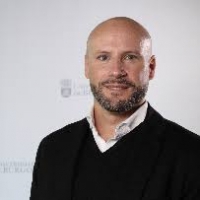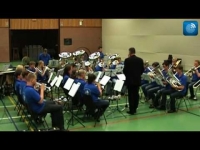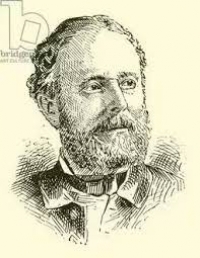Latest Sheet Music
Gilbert DeBenedetti
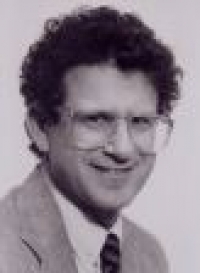
Pittsburgh, Pennsylvania (USA), getting degrees in Music from Carnegie-Mellon University and from the University of Pittsburgh.
Besides arranging music for piano, I have enjoyed teaching Music Theory. I taught that subject at the University of Pittsburgh at Greensburg and at the Pittsburgh High School for Creative and Performing Arts (CAPA). I also have been involved with the Advanced Placement Music Theory Exam, developed and administered by the Educational Testing Service and the College Board.
Besides arranging music for piano, I have enjoyed teaching Music Theory. I taught that subject at the University of Pittsburgh at Greensburg and at the Pittsburgh High School for Creative and Performing Arts (CAPA). I also have been involved with the Advanced Placement Music Theory Exam, developed and administered by the Educational Testing Service and the College Board.
Astor Piazzolla

Ástor Pantaleón Piazzolla (March 11, 1921 – July 4, 1992) was an Argentine tango composer and bandoneón player. His oeuvre revolutionized the traditional tango into a new style termed nuevo tango, incorporating elements from jazz and classical music. An excellent bandoneonist, he regularly performed his own compositions with different ensembles.
Piazzolla's nuevo tango was distinct from the traditional tango in its incorporation of elements of jazz, its use of extended harmonies and dissonance, its use of counterpoint, and its ventures into extended compositional forms. As Argentine psychoanalyst Carlos Kuri has pointed out, Piazzolla's fusion of tango with this wide range of other recognizable Western musical elements was so successful that it produced a new individual style transcending these influences. It is precisely this success, and individuality, that makes it hard to pin down where particular influences reside in his compositions, but some aspects are clear. The use of the passacaglia technique of a circulating bass line and harmonic sequence, invented and much used in 17th and 18th century baroque music but also central to the idea of jazz "changes", predominates in most of Piazzolla's mature compositions. Another clear reference to the baroque is the often complex and virtuosic counterpoint that sometimes follows strict fugal behavior but more often simply allows each performer in the group to assert his voice. A further technique that emphasises this sense of democracy and freedom among the musicians is improvisation that is borrowed from jazz in concept, but in practice involves a different vocabulary of scales and rhythms that stay within the parameters of the established tango sound-world. Pablo Ziegler has been particularly responsible for developing this aspect of the style both within Piazzolla's groups and since the composer's death.
Piazzolla's nuevo tango was distinct from the traditional tango in its incorporation of elements of jazz, its use of extended harmonies and dissonance, its use of counterpoint, and its ventures into extended compositional forms. As Argentine psychoanalyst Carlos Kuri has pointed out, Piazzolla's fusion of tango with this wide range of other recognizable Western musical elements was so successful that it produced a new individual style transcending these influences. It is precisely this success, and individuality, that makes it hard to pin down where particular influences reside in his compositions, but some aspects are clear. The use of the passacaglia technique of a circulating bass line and harmonic sequence, invented and much used in 17th and 18th century baroque music but also central to the idea of jazz "changes", predominates in most of Piazzolla's mature compositions. Another clear reference to the baroque is the often complex and virtuosic counterpoint that sometimes follows strict fugal behavior but more often simply allows each performer in the group to assert his voice. A further technique that emphasises this sense of democracy and freedom among the musicians is improvisation that is borrowed from jazz in concept, but in practice involves a different vocabulary of scales and rhythms that stay within the parameters of the established tango sound-world. Pablo Ziegler has been particularly responsible for developing this aspect of the style both within Piazzolla's groups and since the composer's death.
Nobuo Uematsu

Nobuo Uematsu (植松伸夫 Uematsu Nobuo?, born March 21, 1959) is a Japanese video game composer and musician, best known for scoring the majority of titles in the Final Fantasy series. He is regarded as one of the most famous and respected composers in the video game community. Uematsu is a self-taught musician; he began to play the piano at the age of eleven or twelve, with Elton John as his biggest influence.
Uematsu joined Square (later Square Enix) in 1985, where he met Final Fantasy creator Hironobu Sakaguchi. They have worked together on numerous titles, most notably the games in the Final Fantasy series. After nearly 20 years in the company, he left Square Enix in 2004 and founded his own company called Smile Please, as well as the music production company Dog Ear Records. He has since composed music as a freelancer for video games primarily developed by Square Enix and Sakaguchi's development studio Mistwalker.
A handful of soundtracks and arranged albums of Uematsu's game scores have been released. Pieces from his video game works have been performed in concerts worldwide, and numerous Final Fantasy concerts have also been held. He has worked with Grammy Award-winning conductor Arnie Roth on several of these concerts. In 2002, he formed a rock band with colleagues Kenichiro Fukui and Tsuyoshi Sekito called The Black Mages, in which Uematsu plays the keyboard. The band plays arranged rock versions of Uematsu's Final Fantasy compositions.
Uematsu joined Square (later Square Enix) in 1985, where he met Final Fantasy creator Hironobu Sakaguchi. They have worked together on numerous titles, most notably the games in the Final Fantasy series. After nearly 20 years in the company, he left Square Enix in 2004 and founded his own company called Smile Please, as well as the music production company Dog Ear Records. He has since composed music as a freelancer for video games primarily developed by Square Enix and Sakaguchi's development studio Mistwalker.
A handful of soundtracks and arranged albums of Uematsu's game scores have been released. Pieces from his video game works have been performed in concerts worldwide, and numerous Final Fantasy concerts have also been held. He has worked with Grammy Award-winning conductor Arnie Roth on several of these concerts. In 2002, he formed a rock band with colleagues Kenichiro Fukui and Tsuyoshi Sekito called The Black Mages, in which Uematsu plays the keyboard. The band plays arranged rock versions of Uematsu's Final Fantasy compositions.
A.Kastalsky

Alexandr Dmitriyevich Kastalsky was a Russian composer and folklorist. Kastalsky was born in Moscow to protoiereus Dmitri Ivanovich Kastalsky. He studied music theory, composition and the piano at the Moscow Conservatory.
Antonio Carlos Jobim

Antonio Carlos Brasileiro de Almeida Jobim (January 25, 1927 in Rio de Janeiro – December 8, 1994 in New York City), also known as Tom Jobim, was a Grammy Award-winning Brazilian songwriter, composer, arranger, singer, and pianist/guitarist. A primary force behind the creation of the bossa nova style, Jobim is acknowledged as one of the most influential popular composers of the 20th century. His songs have been performed by many singers and instrumentalists within Brazil and internationally.
Bukas Palad Music Ministry

The Bukas Palad Music Ministry (Filipino for Generous, literally translated as Open Palm in English) is a Roman Catholic community of young people who compose, record, and perform original Filipino religious music. Since 1986, Bukas Palad has recorded over a dozen albums with the Jesuit Music Ministry of Jesuit Communications Foundation, a ministry of the Philippine Province of the Society of Jesus, based in the Ateneo de Manila University campus. and has performed in over a hundred solo concerts across the Philippines, Japan, Hong Kong, and the United States.
Roberto de Vittorio
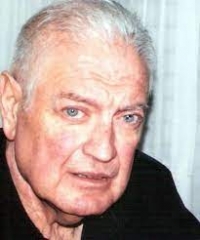
Nació en Buenos Aires el 10 de Octubre de 1939. Estudió violoncello con Roberto Livón. En el año 1969 egresó como Profesor Superior del Conservatorio de Música de San Martin.Estudió guitarra con Jorge Martinez Zárate. Armonía, contrapunto, fuga, composición y orquestación con Cayetano Marcolli, Roberto García Morillo y Juan Francisco Giacobbe y Música concreta en el Instituto Torcuato Di Tella.
Marco Beltrami
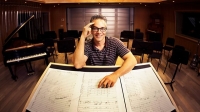
Marco Edward Jonathan Beltrami (born October 7, 1966) is an American composer and conductor of film and television scores. A prolific musician, he has worked in a number of genres, including horror (Mimic, The Faculty, Resident Evil, The Woman in Black, A Quiet Place), action (Terminator 3: Rise of the Machines, Live Free or Die Hard, World War Z), science-fiction (I, Robot, Snowpiercer), Western (3:10 to Yuma, Jonah Hex, The Homesman), and superhero (Hellboy, The Wolverine, Logan).
World of Warcraft

World of Warcraft (WoW) is a massively multiplayer online role-playing game (MMORPG) released in 2004 by Blizzard Entertainment. It is the fourth released game that is set in the Warcraft fantasy universe. World of Warcraft takes place within the Warcraft world of Azeroth, approximately four years after the events at the conclusion of Blizzard's previous Warcraft release, Warcraft III: The Frozen Throne.
Arthur Benjamin

Arthur Leslie Benjamin (18 September 1893, in Sydney – 10 April 1960, in London) was an Australian composer, pianist, conductor and teacher. He is best known as the composer of Jamaican Rumba (1938) and of the Storm Clouds Cantata, featured in both versions of the Alfred Hitchcock film The Man who Knew Too Much (1934), (1956).
Traditional

Théodore Akimenko
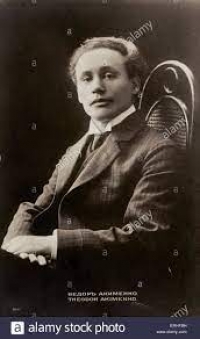
Théodore Akimenko (ou Fiodor Stepanovitch Iakimenko, en russe : Фёдор Степанович Акименко et en ukrainien : Федір Степанович Якименко), né le 8 février 1876 (20 février 1876 dans le calendrier grégorien) à Kharkov dans le gouvernement de Kharkov dans l'Empire russe, et mort le 3 janvier 1945 à Paris, est un pianiste musicologue et compositeur ukrainien.
Bert Kalmar
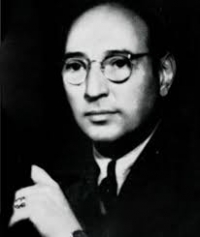
Bert Kalmar (February 10, 1884 – September 18, 1947) was an American lyricist, who was inducted into the Songwriters Hall of Fame in 1970.Kalmar, a native of New York City, left school at an early age and began working in vaudeville. He appeared on stage as a magician, comedian and dancer before switching to songwriting, after a knee injury ended his performing career. By this time, he had earned enough to start a music publishing company, Kalmar and Puck, where he collaborated with a number of songwriters, including Harry Puck (1891–1964) and Harry Ruby. The publishing firm also operated under the name Kalmar, Puck, Abrahams, Consolidated, Inc., the other named partner being Maurice Abrahams (1883–1931)
Paul Simon
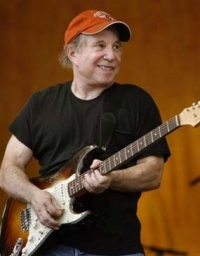
Paul Frederic Simon (born October 13, 1941) is an American songwriter, musician, and member of the Rock and Roll Hall of Fame. In 2006, Time magazine called him one of the 100 "people who shape our world." As of 2007, he resides in New Canaan, Connecticut.
He released Paul Simon in 1972, which contained one of his first experiments with world music, the Jamaican-inspired Mother and Child Reunion, and There Goes Rhymin' Simon in 1973. His 1975 album Still Crazy After All These Years is considered to be among his finest work, particularly the title track and the hit single "50 Ways to Leave Your Lover." The One Trick Pony album, Simon's first album with Warner Bros. Records was also paired with a major motion picture of the same name, with Simon in the starring role. Simon's next album Hearts and Bones, while critically acclaimed, did not yield any hit singles and marked a lull in his commercial popularity in the early 1980s.
In 1985, Simon lent his talents to USA for Africa and performed on the famine relief fundraising single "We Are the World". In 1986 he released the immensely popular Graceland, for which he won a Grammy. The album featured the groundbreaking use of African rhythms and performers such as Ladysmith Black Mambazo. In 1990, he followed up Graceland with the commercially successful and consistent successor album The Rhythm of the Saints, which featured Brazilian musical themes.
His 2000 studio album You're the One, did not reach the commercial heights of previous albums but was considered by many fans and critics to be an artistic success and received a Grammy nomination for Album of the Year. Simon's latest album, Surprise, produced by himself and Brian Eno, was released on May 9, 2006. In commenting on US TV show Ellen what drove him to write material for this latest album, Simon noted the events of September 11, 2001 and also turning 60 since his previous album You're the One.
He released Paul Simon in 1972, which contained one of his first experiments with world music, the Jamaican-inspired Mother and Child Reunion, and There Goes Rhymin' Simon in 1973. His 1975 album Still Crazy After All These Years is considered to be among his finest work, particularly the title track and the hit single "50 Ways to Leave Your Lover." The One Trick Pony album, Simon's first album with Warner Bros. Records was also paired with a major motion picture of the same name, with Simon in the starring role. Simon's next album Hearts and Bones, while critically acclaimed, did not yield any hit singles and marked a lull in his commercial popularity in the early 1980s.
In 1985, Simon lent his talents to USA for Africa and performed on the famine relief fundraising single "We Are the World". In 1986 he released the immensely popular Graceland, for which he won a Grammy. The album featured the groundbreaking use of African rhythms and performers such as Ladysmith Black Mambazo. In 1990, he followed up Graceland with the commercially successful and consistent successor album The Rhythm of the Saints, which featured Brazilian musical themes.
His 2000 studio album You're the One, did not reach the commercial heights of previous albums but was considered by many fans and critics to be an artistic success and received a Grammy nomination for Album of the Year. Simon's latest album, Surprise, produced by himself and Brian Eno, was released on May 9, 2006. In commenting on US TV show Ellen what drove him to write material for this latest album, Simon noted the events of September 11, 2001 and also turning 60 since his previous album You're the One.
Britney Spears

Britney Jean Spears (born 2 December 1981) is an American singer and entertainer. Born in McComb, Mississippi and raised in Kentwood, Louisiana, Spears first appeared on national television as a contestant on the Star Search program in 1992 and went on to star on the television series The New Mickey Mouse Club from 1993–1994. After a brief membership with the pop musical group Innosense, Spears signed a recording contract with Jive Records, releasing her debut album ...Baby One More Time in 1999 which debuted at number one on the Billboard 200.
The title-track of Spears's debut album and its accompanying music video also established her as an international sex symbol, garnering controversy over the influence of her public image on teenage girls.
Spears is ranked as the eighth best-selling female recording artist in the United States according to the Recording Industry Association of America with 31 million certified albums and one of the world's best-selling music artists having sold an estimated 83 million records worldwide.
The title-track of Spears's debut album and its accompanying music video also established her as an international sex symbol, garnering controversy over the influence of her public image on teenage girls.
Spears is ranked as the eighth best-selling female recording artist in the United States according to the Recording Industry Association of America with 31 million certified albums and one of the world's best-selling music artists having sold an estimated 83 million records worldwide.
Natalie Imbruglia

Natalie Jane Imbruglia (born February 4, 1975) is an Australian singer-songwriter, model and actress.
In the early 1990s, Imbruglia was known to audiences as Beth Brennan Willis in the popular Australian soap Neighbours (also responsible for launching pop singers Kylie Minogue, Jason Donovan, Delta Goodrem and Holly Valance). Two years after leaving the program, Natalie launched a singing career with the international hit, "Torn". The subsequent debut album Left of the Middle (1997) sold 7 million copies worldwide. While following releases, White Lilies Island (2001) and Counting Down the Days (2005), have been unable to match the commercial success of her debut, the latter became her first UK #1, and all are critically acclaimed. To date she has sold more than 10 million records worldwide.
In the early 1990s, Imbruglia was known to audiences as Beth Brennan Willis in the popular Australian soap Neighbours (also responsible for launching pop singers Kylie Minogue, Jason Donovan, Delta Goodrem and Holly Valance). Two years after leaving the program, Natalie launched a singing career with the international hit, "Torn". The subsequent debut album Left of the Middle (1997) sold 7 million copies worldwide. While following releases, White Lilies Island (2001) and Counting Down the Days (2005), have been unable to match the commercial success of her debut, the latter became her first UK #1, and all are critically acclaimed. To date she has sold more than 10 million records worldwide.
Handel

George Frideric Handel (Friday, 23 February 1685 - Saturday, 14 April 1759) was a German-born Baroque composer who is famous for his operas, oratorios and concerti grossi. Born as Georg Friedrich Handel in Halle, he spent most of his adult life in England, becoming a subject of the British crown on 22 January 1727. His most famous works are Messiah, an oratorio set to texts from the King James Bible; Water Music; and Music for the Royal Fireworks. Strongly influenced by the techniques of the great composers of the Italian Baroque and the English composer Henry Purcell, his music was known to many significant composers who came after him, including Haydn, Mozart, and Beethoven.
Handel's compositions include 42 operas; 29 oratorios; more than 120 cantatas, trios and duets; numerous arias; chamber music; a large number of ecumenical pieces; odes and serenatas; and sixteen organ concerti. His most famous work, the Messiah oratorio with its "Hallelujah" chorus, is among the most popular works in choral music and has become a centerpiece of the Christmas season. Also popular are the Opus 3 and 6 Concerti Grossi, as well as "The Cuckoo and the Nightingale", in which birds are heard calling during passages played in different keys representing the vocal ranges of two birds. Also notable are his sixteen keyboard suites, especially The Harmonious Blacksmith.
Handel introduced various previously uncommon musical instruments in his works: the viola d'amore and violetta marina (Orlando), the lute (Ode for St. Cecilia's Day), three trombones (Saul), clarinets or small high cornets (Tamerlano), theorbo, French horn (Water Music), lyrichord, double bassoon, viola da gamba, bell chimes, positive organ, and harp (Giulio Cesare, Alexander's Feast).
Handel's compositions include 42 operas; 29 oratorios; more than 120 cantatas, trios and duets; numerous arias; chamber music; a large number of ecumenical pieces; odes and serenatas; and sixteen organ concerti. His most famous work, the Messiah oratorio with its "Hallelujah" chorus, is among the most popular works in choral music and has become a centerpiece of the Christmas season. Also popular are the Opus 3 and 6 Concerti Grossi, as well as "The Cuckoo and the Nightingale", in which birds are heard calling during passages played in different keys representing the vocal ranges of two birds. Also notable are his sixteen keyboard suites, especially The Harmonious Blacksmith.
Handel introduced various previously uncommon musical instruments in his works: the viola d'amore and violetta marina (Orlando), the lute (Ode for St. Cecilia's Day), three trombones (Saul), clarinets or small high cornets (Tamerlano), theorbo, French horn (Water Music), lyrichord, double bassoon, viola da gamba, bell chimes, positive organ, and harp (Giulio Cesare, Alexander's Feast).
Franz Schubert

Franz Peter Schubert (German pronunciation: ; January 31, 1797 – November 19, 1828) was an Austrian composer. He wrote some 600 Lieder, nine symphonies (including the famous "Unfinished Symphony"), liturgical music, operas, some incidental music, and a large body of chamber and solo piano music. He is particularly noted for his original melodic and harmonic writing.
Schubert was born into a musical family, and received formal musical training through much of his childhood. While Schubert had a close circle of friends and associates who admired his work (amongst them the prominent singer Johann Michael Vogl), wide appreciation of his music during his lifetime was limited at best. He was never able to secure adequate permanent employment, and for most of his career he relied on the support of friends and family. He made some money from published works, and occasionally gave private musical instruction. In the last year of his life he began to receive wider acclaim. He died at the age of 31 of "typhoid fever", a diagnosis which was vague at the time; several scholars suspect the real illness was tertiary syphilis.
Interest in Schubert's work increased dramatically in the decades following his death. Composers like Franz Liszt, Robert Schumann and Felix Mendelssohn discovered, collected, and championed his works in the 19th century, as did musicologist Sir George Grove. Franz Schubert is now widely considered to be one of the greatest composers in the Western tradition.
Schubert was born into a musical family, and received formal musical training through much of his childhood. While Schubert had a close circle of friends and associates who admired his work (amongst them the prominent singer Johann Michael Vogl), wide appreciation of his music during his lifetime was limited at best. He was never able to secure adequate permanent employment, and for most of his career he relied on the support of friends and family. He made some money from published works, and occasionally gave private musical instruction. In the last year of his life he began to receive wider acclaim. He died at the age of 31 of "typhoid fever", a diagnosis which was vague at the time; several scholars suspect the real illness was tertiary syphilis.
Interest in Schubert's work increased dramatically in the decades following his death. Composers like Franz Liszt, Robert Schumann and Felix Mendelssohn discovered, collected, and championed his works in the 19th century, as did musicologist Sir George Grove. Franz Schubert is now widely considered to be one of the greatest composers in the Western tradition.
Amy Beach
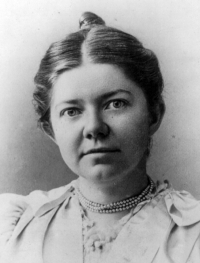
Amy Marcy Cheney Beach (September 5, 1867 – December 27, 1944) was an American composer and pianist. She was the first successful American female composer of large-scale art music. As a pianist, she was acclaimed for concerts she gave in the United States and in Germany.
Lev Zemlinski

Born in 1958, Lev Zemlinski studied in Moscow Telecommunication University (electronics) and Moscow Musical College (jazz piano). While being a student he began his career as a band musician, bandleader and arranger, working with various Moscow band and solo artists. He also studied jazz in Moscow Experimental Jazz Studio - the small island of freedom in the sea of .
Mozart

Wolfgang Amadeus Mozart, full name Johann Chrysostom Wolfgang Amadeus Mozart (27 January 1756 â 5 December 1791) was a prolific and influential composer of the Classical era. His over 600 compositions include works widely acknowledged as pinnacles of symphonic, concertante, chamber, piano, operatic, and choral music. Mozart is among the most enduringly popular of classical composers, and many of his works are part of the standard concert repertoire.
Mozart's music, like Haydn's, stands as an archetypal example of the Classical style. His works spanned the period during which that style transformed from one exemplified by the style galant to one that began to incorporate some of the contrapuntal complexities of the late Baroque, complexities against which the galant style had been a reaction. Mozart's own stylistic development closely paralleled the development of the classical style as a whole. In addition, he was a versatile composer and wrote in almost every major genre, including symphony, opera, the solo concerto, chamber music including string quartet and string quintet, and the piano sonata. While none of these genres were new, the piano concerto was almost single-handedly developed and popularized by Mozart. He also wrote a great deal of religious music, including masses; and he composed many dances, divertimenti, serenades, and other forms of light entertainment.
The central traits of the classical style can be identified in Mozart's music. Clarity, balance, and transparency are hallmarks of his work.
Mozart's music, like Haydn's, stands as an archetypal example of the Classical style. His works spanned the period during which that style transformed from one exemplified by the style galant to one that began to incorporate some of the contrapuntal complexities of the late Baroque, complexities against which the galant style had been a reaction. Mozart's own stylistic development closely paralleled the development of the classical style as a whole. In addition, he was a versatile composer and wrote in almost every major genre, including symphony, opera, the solo concerto, chamber music including string quartet and string quintet, and the piano sonata. While none of these genres were new, the piano concerto was almost single-handedly developed and popularized by Mozart. He also wrote a great deal of religious music, including masses; and he composed many dances, divertimenti, serenades, and other forms of light entertainment.
The central traits of the classical style can be identified in Mozart's music. Clarity, balance, and transparency are hallmarks of his work.
Hiroshi Yamazaki

Hiroshi Yamazaki began playing classical piano at the age of seven in Osaka, Japan.As a young adult, he attended the Osaka College of Music. It was there where Hiroshi was introduced to jazz, the style of music that would quickly become his passion. At age 22, Hiroshi gave his first professional jazz performance, leading a trio at the popular S.A.B. Hall in Osaka. Shortly after completing his collegiate studies in Japan, Hiroshi moved to New York City. There, he continued to grow as a musician and a performer.
Craig Armstrong
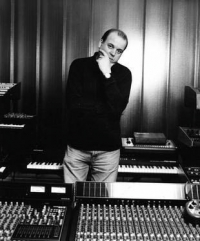
Craig Armstrong OBE (born 1959) is a Scottish composer of modern orchestral music, electronica and film scores.
Armstrong was born in Glasgow, Scotland in 1959. He studied musical composition, violin and piano at the Royal Academy of Music from 1977 to 1981, where he was awarded the Charles Lucas prize and the Harvey Lohr scholarship for composition. He was also awarded the FTCL Fellowship in composition, and won the GLAA Young Jazz Musician of the Year in 1982. Upon completing his studies, Armstrong served as music and dance specialist at the Strathclyde Regional Council in 1984.
Armstrong's score for Baz Luhrmann’s groundbreaking musical Moulin Rouge! earned him AFI’s Composer of the Year, a Golden Globe for Best Original Score of the Year and a BAFTA for Achievement in Film Music. His score for Phillip Noyce’s The Quiet American garnered him the Ivor Novello Award for Best Original Film Score. His other feature film scoring credits include the Oliver Stone drama World Trade Center; the Oscar®-winning bio-pic Ray for which Armstrong was awarded a Grammy for Best Original Score; and the worldwide ensemble comedy smash Love Actually. His scores can also be heard in The Magdalene Sisters, Kiss of the Dragon, The Bone Collector, The Clearing, Plunkett & Macleane, Best Laid Plans, Orphans, Elizabeth: The Golden Age and most recently Louis Leterrier’s Incredible Hulk. His score to William Shakespeare’s Romeo + Juliet (again with Baz Luhrmann) also earned him a BAFTA for Achievement in Film Music and an Ivor Novello.
Armstrong was born in Glasgow, Scotland in 1959. He studied musical composition, violin and piano at the Royal Academy of Music from 1977 to 1981, where he was awarded the Charles Lucas prize and the Harvey Lohr scholarship for composition. He was also awarded the FTCL Fellowship in composition, and won the GLAA Young Jazz Musician of the Year in 1982. Upon completing his studies, Armstrong served as music and dance specialist at the Strathclyde Regional Council in 1984.
Armstrong's score for Baz Luhrmann’s groundbreaking musical Moulin Rouge! earned him AFI’s Composer of the Year, a Golden Globe for Best Original Score of the Year and a BAFTA for Achievement in Film Music. His score for Phillip Noyce’s The Quiet American garnered him the Ivor Novello Award for Best Original Film Score. His other feature film scoring credits include the Oliver Stone drama World Trade Center; the Oscar®-winning bio-pic Ray for which Armstrong was awarded a Grammy for Best Original Score; and the worldwide ensemble comedy smash Love Actually. His scores can also be heard in The Magdalene Sisters, Kiss of the Dragon, The Bone Collector, The Clearing, Plunkett & Macleane, Best Laid Plans, Orphans, Elizabeth: The Golden Age and most recently Louis Leterrier’s Incredible Hulk. His score to William Shakespeare’s Romeo + Juliet (again with Baz Luhrmann) also earned him a BAFTA for Achievement in Film Music and an Ivor Novello.
Nikolai Kedrov
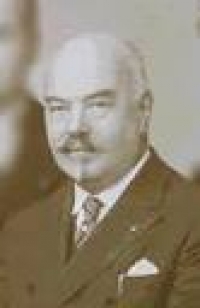
Nikolay Nikolayevich Kedrov Sr. was a Russian composer of liturgical music. His setting of Otche Nash is one of the best-known in the repertoire.
Offenbach

Jacques Offenbach (20 June 1819 – 5 October 1880) was a Prussian-born French composer, cellist and impresario. He is remembered for his nearly 100 operettas of the 1850s–1870s and his uncompleted opera The Tales of Hoffmann. He was a powerful influence on later composers of the operetta genre, particularly Johann Strauss, Jr. and Arthur Sullivan. His best-known works were continually revived during the 20th century, and many of his operettas continue to be staged in the 21st. The Tales of Hoffman remains part of the standard opera repertory.
pat metheny
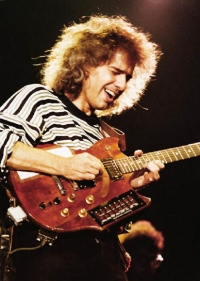
Patrick Bruce "Pat" Metheny (/məˈθiːni/ mə-thee-nee; born August 12, 1954) is an American jazz guitarist and composer.
He is the leader of the Pat Metheny Group and is also involved in duets, solo works and other side projects. His style incorporates elements of progressive and contemporary jazz, post-bop, latin jazz and jazz fusion. Pat Metheny has three gold albums and 20 Grammy Awards. He is the brother of jazz flugelhornist and journalist Mike Metheny.
He is the leader of the Pat Metheny Group and is also involved in duets, solo works and other side projects. His style incorporates elements of progressive and contemporary jazz, post-bop, latin jazz and jazz fusion. Pat Metheny has three gold albums and 20 Grammy Awards. He is the brother of jazz flugelhornist and journalist Mike Metheny.
W.A. Mozart

Wolfgang Amadeus Mozart (German: , full baptismal name Johannes Chrysostomus Wolfgangus Theophilus Mozart (27 January 1756 – 5 December 1791), was a prolific and influential composer of the Classical era. He composed over 600 works, many acknowledged as pinnacles of symphonic, concertante, chamber, piano, operatic, and choral music. He is among the most enduringly popular of classical composers.
Mozart showed prodigious ability from his earliest childhood in Salzburg. Already competent on keyboard and violin, he composed from the age of five and performed before European royalty; at 17 he was engaged as a court musician in Salzburg, but grew restless and traveled in search of a better position, always composing abundantly. While visiting Vienna in 1781, he was dismissed from his Salzburg position. He chose to stay in the capital, where he achieved fame but little financial security. During his final years in Vienna, he composed many of his best-known symphonies, concertos, and operas, and the Requiem. The circumstances of his early death have been much mythologized. He was survived by his wife Constanze and two sons.
Mozart learned voraciously from others, and developed a brilliance and maturity of style that encompassed the light and graceful along with the dark and passionate—the whole informed by a vision of humanity "redeemed through art, forgiven, and reconciled with nature and the absolute." His influence on subsequent Western art music is profound. Beethoven wrote his own early compositions in the shadow of Mozart, of whom Joseph Haydn wrote that "posterity will not see such a talent again in 100 years."
Mozart showed prodigious ability from his earliest childhood in Salzburg. Already competent on keyboard and violin, he composed from the age of five and performed before European royalty; at 17 he was engaged as a court musician in Salzburg, but grew restless and traveled in search of a better position, always composing abundantly. While visiting Vienna in 1781, he was dismissed from his Salzburg position. He chose to stay in the capital, where he achieved fame but little financial security. During his final years in Vienna, he composed many of his best-known symphonies, concertos, and operas, and the Requiem. The circumstances of his early death have been much mythologized. He was survived by his wife Constanze and two sons.
Mozart learned voraciously from others, and developed a brilliance and maturity of style that encompassed the light and graceful along with the dark and passionate—the whole informed by a vision of humanity "redeemed through art, forgiven, and reconciled with nature and the absolute." His influence on subsequent Western art music is profound. Beethoven wrote his own early compositions in the shadow of Mozart, of whom Joseph Haydn wrote that "posterity will not see such a talent again in 100 years."
Alan Menken

Alan Menken (born July 22, 1949 in New Rochelle, New York) is an American Broadway and an eight-time Academy Award winning composer and pianist. Menken has collaborated with several renowned lyricists including Howard Ashman (1950-1991), Tim Rice and Stephen Schwartz.
Krezip

Krezip is a Dutch band from Tilburg. Active members are singer and pianist Jacqueline Govaert, her sister Anne Govaert on guitar, Annelies Kuijsters playing keyboards, and Joost van Haaren on the bass guitar. In 2004 guitar player Thomas Holthuis was replaced by JanPeter Hoekstra and drummer Thijs Romeijn by Bram van den Berg.
Krezip started as a four-member school band during 1997, in Tilburg, The Netherlands. A year later a new drummer was added. During 1998 Krezip was an act at many festivals throughout the country, such as Festival Mundial, Noorderslag, and Lowlands. Studies and age became a sticking point to accept big offers in the music world. The first official sign of their existence came in 1999, when the band released a demo album on their own label called "Run Around". Big success however didn't materialize until 2000.
The meaning of the name 'Krezip' is rather unclear. Most likely, this name has been chosen as an anagram for 'perzik', the Dutch word for peach, since the band members have continually been eating peaches during their rehearsals.
Jacqueline Govaert has written all of Krezip's songs. She started writing music when she was 12 years old. She states that she can write the best when she doesn't understand anything of the world.
Krezip started as a four-member school band during 1997, in Tilburg, The Netherlands. A year later a new drummer was added. During 1998 Krezip was an act at many festivals throughout the country, such as Festival Mundial, Noorderslag, and Lowlands. Studies and age became a sticking point to accept big offers in the music world. The first official sign of their existence came in 1999, when the band released a demo album on their own label called "Run Around". Big success however didn't materialize until 2000.
The meaning of the name 'Krezip' is rather unclear. Most likely, this name has been chosen as an anagram for 'perzik', the Dutch word for peach, since the band members have continually been eating peaches during their rehearsals.
Jacqueline Govaert has written all of Krezip's songs. She started writing music when she was 12 years old. She states that she can write the best when she doesn't understand anything of the world.
Darius Milhaud
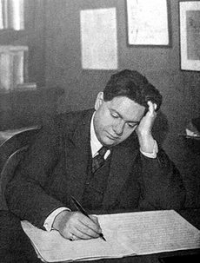
Darius Milhaud (French pronunciation: ; 4 September 1892 – 22 June 1974) was a French composer and teacher. He was a member of Les Six—also known as The Group of Six—and one of the most prolific composers of the 20th century. His compositions are influenced by jazz and make use of polytonality (music in more than one key at once).
Tom Kitt
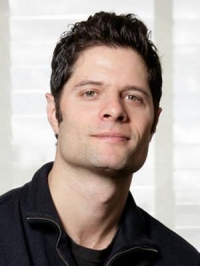
Thomas Robert "Tom" Kitt (born 1974) is an American composer, conductor, orchestrator and musician. For his score for the musical Next to Normal, he shared the 2010 Pulitzer Prize for Drama with Brian Yorkey. He also won the Tony Award and 2008 Outer Critics Circle Award, and was nominated for a Drama Desk Award for American Idiot and Everyday Rapture.
Kim Taeyeon

Kim Tae-yeon, known mononymously as Taeyeon, is a South Korean singer. She debuted as a member of girl group Girls' Generation in August 2007, which went on to become one of the best-selling artists in South Korea and one of the most popular K-pop groups worldwide.
Chopin

Frédéric Chopin (1 March 1810 – 17 October 1849) was a Polish composer and virtuoso pianist of the Romantic period. He is widely regarded as the greatest Polish composer, and ranks as one of music's greatest tone poets.
He was born in the village of Żelazowa Wola, in the Duchy of Warsaw, to a Polish mother and French-expatriate father, and in his early life was regarded as a child-prodigy pianist. In November 1830, at the age of 20, Chopin went abroad; following the suppression of the Polish November Uprising of 1830–31, he became one of many expatriates of the Polish "Great Emigration."
In Paris, he made a comfortable living as a composer and piano teacher, while giving few public performances. A Polish patriot,
Chopin's extant compositions were written primarily for the piano as a solo instrument. Though technically demanding, Chopin's style emphasizes nuance and expressive depth rather than virtuosity. Chopin invented musical forms such as the ballade and was responsible for major innovations in forms such as the piano sonata, waltz, nocturne, étude, impromptu and prelude. His works are mainstays of Romanticism in 19th-century classical music.
He was born in the village of Żelazowa Wola, in the Duchy of Warsaw, to a Polish mother and French-expatriate father, and in his early life was regarded as a child-prodigy pianist. In November 1830, at the age of 20, Chopin went abroad; following the suppression of the Polish November Uprising of 1830–31, he became one of many expatriates of the Polish "Great Emigration."
In Paris, he made a comfortable living as a composer and piano teacher, while giving few public performances. A Polish patriot,
Chopin's extant compositions were written primarily for the piano as a solo instrument. Though technically demanding, Chopin's style emphasizes nuance and expressive depth rather than virtuosity. Chopin invented musical forms such as the ballade and was responsible for major innovations in forms such as the piano sonata, waltz, nocturne, étude, impromptu and prelude. His works are mainstays of Romanticism in 19th-century classical music.
Franz Liszt

Franz Liszt (Hungarian: Ferencz Liszt, in modern usage Ferenc Liszt, from 1859 to 1865 officially Franz Ritter von Liszt) (October 22, 1811 – July 31, 1886) was a Hungarian composer, virtuoso pianist and teacher. He was also the father-in-law of Richard Wagner. In 1865 he became abbot in the Roman Catholic Church.
Liszt became renowned throughout Europe during the 19th century for his great skill as a performer. He was said by his contemporaries to have been the most technically advanced pianist of his age and perhaps the greatest pianist of all time. He was also an important and influential composer, a notable piano teacher, a conductor who contributed significantly to the modern development of the art, and a benefactor to other composers and performers, notably Richard Wagner, Hector Berlioz, Camille Saint-Saëns, Edvard Grieg and Alexander Borodin.
As a composer, Liszt was one of the most prominent representatives of the "Neudeutsche Schule" ("New German School"). He left behind a huge and diverse body of work, in which he influenced his forward-looking contemporaries and anticipated some 20th-century ideas and trends. Some of his most notable contributions were the invention of the symphonic poem, developing the concept of thematic transformation as part of his experiments in musical form and making radical departures in harmony.
Liszt became renowned throughout Europe during the 19th century for his great skill as a performer. He was said by his contemporaries to have been the most technically advanced pianist of his age and perhaps the greatest pianist of all time. He was also an important and influential composer, a notable piano teacher, a conductor who contributed significantly to the modern development of the art, and a benefactor to other composers and performers, notably Richard Wagner, Hector Berlioz, Camille Saint-Saëns, Edvard Grieg and Alexander Borodin.
As a composer, Liszt was one of the most prominent representatives of the "Neudeutsche Schule" ("New German School"). He left behind a huge and diverse body of work, in which he influenced his forward-looking contemporaries and anticipated some 20th-century ideas and trends. Some of his most notable contributions were the invention of the symphonic poem, developing the concept of thematic transformation as part of his experiments in musical form and making radical departures in harmony.
Rufus Wainwright
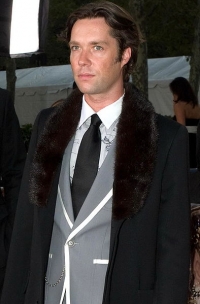
Rufus McGarrigle Wainwright (born July 22, 1973) is a Grammy-nominated, Canadian-American singer-songwriter. He has recorded five albums of original music, EPs, and tracks on compilations and film soundtracks.
In addition to his baritone singing voice, he plays piano and guitar, often switching between the two instruments when performing live. While some songs feature just Wainwright and his piano, his later work is often accompanied by rock instrumentation or a symphony orchestra, displaying complex layering and harmonies with an operatic feel. Wainwright is an opera fan and likes Franz Schubert's Lieder. Some of Wainwright's songs are described as "popera" (pop opera) or "baroque pop". Many of his compositions are densely packed amalgams of strings, horns, operatic choruses, ragtime rhythms, with a warm vocal timbre.
He often performs with his sister, Martha Wainwright, on backup vocals. Despite critical acclaim, Wainwright has experienced limited commercial success in the United States, although the release of Release the Stars saw increased media attention there, as did the associated 2007 U.S. tour.
In addition to his baritone singing voice, he plays piano and guitar, often switching between the two instruments when performing live. While some songs feature just Wainwright and his piano, his later work is often accompanied by rock instrumentation or a symphony orchestra, displaying complex layering and harmonies with an operatic feel. Wainwright is an opera fan and likes Franz Schubert's Lieder. Some of Wainwright's songs are described as "popera" (pop opera) or "baroque pop". Many of his compositions are densely packed amalgams of strings, horns, operatic choruses, ragtime rhythms, with a warm vocal timbre.
He often performs with his sister, Martha Wainwright, on backup vocals. Despite critical acclaim, Wainwright has experienced limited commercial success in the United States, although the release of Release the Stars saw increased media attention there, as did the associated 2007 U.S. tour.
Antonio Tauriello
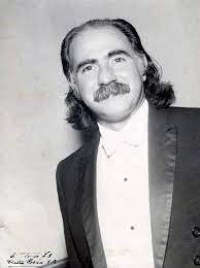
Antonio Tauriello (b. 20 March 1931), Argentine composer, pianist, and conductor. Born in Buenos Aires, he studied composition with Alberto Ginastera at the National Conservatory and piano with Walter Gieseking in Tucumán.
Larry Teal
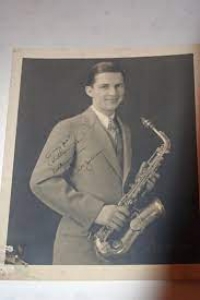
Larry Teal (26 March 1905 - 11 July 1984) is considered by many to be the father of American orchestral saxophone.
Laurence Lyon (Larry) Teal earned a bachelor's degree in pre-dentistry from the University of Michigan. Although he came to the University of Michigan to study dentistry, he soon became involved with Wilson's Wolverines—a jazz band with a more than local following. He toured Europe with them for several years and later returned to the States only to be recruited by Glen Gray's Casa Loma Orchestra of Detroit, one of the important society orchestras of the period. He later earned a Doctor of Music from the Detroit Institute of Musical Arts in 1943.
Laurence Lyon (Larry) Teal earned a bachelor's degree in pre-dentistry from the University of Michigan. Although he came to the University of Michigan to study dentistry, he soon became involved with Wilson's Wolverines—a jazz band with a more than local following. He toured Europe with them for several years and later returned to the States only to be recruited by Glen Gray's Casa Loma Orchestra of Detroit, one of the important society orchestras of the period. He later earned a Doctor of Music from the Detroit Institute of Musical Arts in 1943.
Tazenda
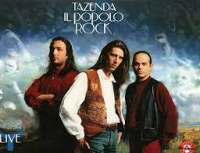
Tazenda is a Sardinian ethnic pop-rock band. The group was formed in Sardinia in 1988 by Andrea Parodi, Gigi Camedda and Gino Marielli. The group's music is characterized by the influence from traditional Sardinian music; the lyrics of most of its songs are in Sardinian language rather than Italian.
Boys Will Be Boys

Boys Will Be Boys refers to multiple artists: 1) Powerpop band from Fairfax, VA 2) House supergroup made up of Tiësto, Angger Dimas and Showtek. 3) Indie rock/lo-fi band from Latvia 1) Boys Will Be Boys, those 4 simple word could easily sum up the band, Lehi (Vox/bass), Mark Wood (Drums/ pr…
Charles-Marie-François Bosselet
Charles-Marie-François Bosselet Composer.
Eagles
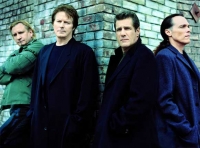
The Eagles are an American rock band that was formed in Los Angeles, California during the early 1970s. With five Number 1 singles and six Number 1 albums, the Eagles were one of the most successful recording artists of the decade. At the end of the 20th century, two of their albums, Eagles: Their Greatest Hits 1971–1975 and Hotel California, ranked among the ten best-selling albums according to the Recording Industry Association of America. The best-selling studio album Hotel California is rated as the thirty-seventh album in the Rolling Stone list "The 500 Greatest Albums of All Time", and the band was ranked number 75 on Rolling Stone's 2004 list of the 100 Greatest Artists of All Time. They are also the best-selling American group ever, with Eagles: Their Greatest Hits 1971–1975 being the best-selling album in the U.S. to date.
The Eagles broke up in 1980, but reunited in 1994 for Hell Freezes Over, a mix of live and new studio tracks. They have toured intermittently since then, and were inducted into the Rock and Roll Hall of Fame in 1998.
In 2007, the Eagles released Long Road out of Eden, their first full studio album in 28 years.
Members:
Glenn Frey
Don Henley
Joe Walsh
Timothy B. Schmit
The Eagles broke up in 1980, but reunited in 1994 for Hell Freezes Over, a mix of live and new studio tracks. They have toured intermittently since then, and were inducted into the Rock and Roll Hall of Fame in 1998.
In 2007, the Eagles released Long Road out of Eden, their first full studio album in 28 years.
Members:
Glenn Frey
Don Henley
Joe Walsh
Timothy B. Schmit
Brian Doerksen
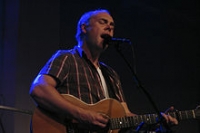
Brian Robert Doerksen (pronounced "durkson") is a Canadian Christian singer-songwriter and worship leader from Abbotsford, British Columbia born in 1965.
Pablo de Sarasate

Pablo Martín Melitón de Sarasate y Navascués (10 March 1844 – 20 September 1908) was a Spanish violinist and composer of the Romantic period.
South Border

South Border is a Filipino pop and R&B band formed in the early 1990s who gained recognition in the music scene in the mid 1990s to the 2000s.Originally formed in 1993, the band whose name is a tribute to their roots in Davao down south, first came into national prominence in 1996 when they launched their first self-titled album. It included a Jimmy Antiporda song entitled "May Pag-Ibig Pa Kaya" which they interpreted in the Metro Manila Pop Music Festival earlier that year. Another song, "Kahit Kailan" was awarded 1996 Song of the Year by various radio stations, thus giving them their first big hit.
Sweet Smell of Success
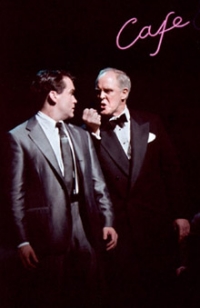
Sweet Smell of Success is a musical created by Marvin Hamlisch, Craig Carnelia, and John Guare. The show is based on the 1957 movie of the same name, which in turn was based on the 1955 novelette of the same name by Ernest Lehman. The show tells the story of a powerful newspaper columnist named J. J.
Bleach

Ichigo Kurosaki never asked for the ability to see ghosts -- he was born with the gift. When his family is attacked by a Hollow -- a malevolent lost soul -- Ichigo becomes a Soul Reaper, dedicating his life to protecting the innocent and helping the tortured spirits themselves find peace.
Kimura Yumi

Youmi Kimura is a Japanese singer and lyre performer. She was born in Osaka Prefecture, Japan, and became famous in 2001 for her song "Itsumo nando demo", which served as the closing theme to the popular 2001 anime film Spirited Away by Hayao Miyazaki. Kimura and Miyazaki had great admiration for each other's works.
Larry Barton
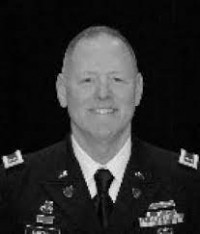
Larry Barton, a graduate of Eastern Kentucky University (1979), has over 30 published compositions for Marching Band and Jazz Ensemble with C. L. Barnhouse Company since 1992. Mr. Barton brings a wealth of teaching, learning, and conducting experience to his compositions. He has served as Band Director of the Bardstown Independent and Madison County School Districts in Kentucky, and Commander/Conductor of the 100th Division US Army Reserve Band, Ft. Knox, Kentucky, teaching and working with young people in grades 5-12 and beyond. Mr. Barton is presently an assistant principal in Madison County. His services as an arranger, composer, and adjudicator are in great
Jeff Bowen

Jeff Bowen (born August 30, 1971, in Baltimore, Maryland) is an American composer, lyricist and actor. He is best known as one of the authors and stars of the Broadway musical . He is currently developing a television show for ABC with his collaborator Hunter Bell.
Bowen attended college at Stetson University in Deland, Florida. He currently resides in Brooklyn, New York with his life partner Michael Berresse.
Bowen attended college at Stetson University in Deland, Florida. He currently resides in Brooklyn, New York with his life partner Michael Berresse.
Ennio Morricone
Ennio Morricone, OMRI (born November 10, 1928), is an Italian composer and conductor. He has composed and arranged scores for more than 500 film and television productions. Morricone is considered as one of the most influential film composers since the late 1950s. He is well-known for his long-term collaborations with international acclaimed directors such as Sergio Leone, Brian De Palma, Barry Levinson, and Giuseppe Tornatore.
He wrote the characteristic film scores of Leone's Spaghetti Westerns A Fistful of Dollars (1964), For a Few Dollars More (1965), The Good, the Bad and the Ugly (1966), Once Upon a Time in the West (1968), The Great Silence (1968), and My Name Is Nobody (1973). In the 80s, Morricone composed the scores for John Carpenter's horror movie The Thing (1982), Leone's Once Upon a Time in America (1984), Roland Joffé's The Mission (1986), Brian De Palma's The Untouchables (1987) and Giuseppe Tornatore's Cinema Paradiso (1988).
His more recent compositions include the scores for Oliver Stone's U Turn (1997), Tornatore's The Legend of 1900 (1998) and Malèna (2000), Mission to Mars (2000) by Brian De Palma, Fateless (2005), and Baaria - La porta del vento (2009). Ennio Morricone has won two Grammy Awards, two Golden Globes and five Anthony Asquith Awards for Film Music by BAFTA in 1979–1992. He has been nominated for five Academy Awards for Best Music, Original Score in 1979–2001. Morricone received the Honorary Academy Award in 2007 "for his magnificent and multifaceted contributions to the art of film music". He was the second composer to receive this award after its introduction in 1928.
He wrote the characteristic film scores of Leone's Spaghetti Westerns A Fistful of Dollars (1964), For a Few Dollars More (1965), The Good, the Bad and the Ugly (1966), Once Upon a Time in the West (1968), The Great Silence (1968), and My Name Is Nobody (1973). In the 80s, Morricone composed the scores for John Carpenter's horror movie The Thing (1982), Leone's Once Upon a Time in America (1984), Roland Joffé's The Mission (1986), Brian De Palma's The Untouchables (1987) and Giuseppe Tornatore's Cinema Paradiso (1988).
His more recent compositions include the scores for Oliver Stone's U Turn (1997), Tornatore's The Legend of 1900 (1998) and Malèna (2000), Mission to Mars (2000) by Brian De Palma, Fateless (2005), and Baaria - La porta del vento (2009). Ennio Morricone has won two Grammy Awards, two Golden Globes and five Anthony Asquith Awards for Film Music by BAFTA in 1979–1992. He has been nominated for five Academy Awards for Best Music, Original Score in 1979–2001. Morricone received the Honorary Academy Award in 2007 "for his magnificent and multifaceted contributions to the art of film music". He was the second composer to receive this award after its introduction in 1928.
 Sheet Music Max is a site for those who wants to access popular sheet music easily,
letting them download the sheet music for free for trial purposes.
It's completely free to download and try the listed sheet music, but you have to delete the files after 24 hours of trial.
Don't forget, if you like the piece of music you have just learned playing,
treat the artist with respect, and go buy the original sheet music.
Sheet Music Max is a site for those who wants to access popular sheet music easily,
letting them download the sheet music for free for trial purposes.
It's completely free to download and try the listed sheet music, but you have to delete the files after 24 hours of trial.
Don't forget, if you like the piece of music you have just learned playing,
treat the artist with respect, and go buy the original sheet music.
